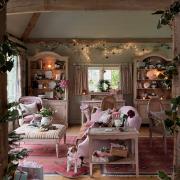Susie Carter talks to Michelin star chef Alex Aitken about his favourite food producers, Lime Wood and forest forays
Alex Aitken is one of Hampshire’s most renowned chefs. His first restaurant, Le Poussin, earned a Michelin star in 1995 which it retained for 14 years as it moved first to Parkhill in Lyndhurst and then to Whitley Ridge in Brockenhurst. This is a remarkable achievement, but what makes it extraordinary is the fact that Alex only taught himself to cook when he and his wife first opened the business in 1983 – a fact that Gordon Ramsey noted when he named Le Poussin one of his top 11 favourite places to eat in The Times.Fast forward to November 2009, which saw the opening of Lime Wood, the �30 million reincarnation of Le Poussin’s former home, Parkhill, and the new location of Alex Aitken’s restaurant. While the hotel may have been ready for a change of direction, the food needed no such treatment. When I asked how long it took him to create the new menus, Alex replied: “A bottle of wine and an evening!” He explained that the dishes on the menu have been developed over a number of years: “We change very slowly now. If you want to keep standards high, you’ve got to be consistent.” The dishes alter naturally with the seasons and if one ingredient isn’t up to scratch that day, Alex will adapt the dish to showcase something that is.
To marketWhen you read one of Alex’s menus, it’s immediately apparent that Hampshire produce is a real passion. “I always take my inspiration from the ingredients. Some chefs let themselves down by writing menus, then trying to find ingredients.” Alex’s wife, Caroline, does a lot of work on the food sourcing and she is well qualified, having grown up on a Hampshire farm. “We make the point of visiting the farmers’ markets – Petersfield, Winchester and Romsey are great!”“We’ve always championed local produce and I’ve befriended fishermen, stalkers, and even in the early days, people with allotments.” Gone are the days when villagers can wander in and exchange a basket of rosemary for a meal, but Alex’s connection with the producers remains. “A couple of local fishermen asked me to go out with them, so I did a couple of days on the lobster pots.” Alex’s uncle was a lobster fisherman in Scotland and he has some experience himself: “I lived in a little fishing village called Dumbar on the East coast of Scotland and I worked there for two seasons. It gives me a connection with the fishermen because I can understand what they’re doing – I’ve done it myself.”
Taking careAs well as championing Hampshire producers, Alex also produces a huge amount himself, both at the hotel and at home. “At Christmas last year, every turkey served in the restaurant was reared on-site at Whitley Ridge. They were Norfolk Blacks and totally free-range, but they had a habit of flying out of the field they were in and roosting on the chefs’ cars. At one point we counted six of them on a Renault Clio!”In fact, turkeys aren’t the only livestock lucky enough to have been guests at one of the hotels. Alex explained about the orphan lambs donated by a local farmer which the staff and guests helped to bottle-feed. “We’ve also been experimenting with different types of beef. My wife Caroline feeds them on barley soaked in beer for the last two months which does two things: puts more fat on, which adds flavour, and gives them more of an appetite, so they put more bulk on too. Plus of course, we never have to chase our cows! We just wave a bucket and they follow us wherever we go.”Alex and his wife pride themselves on excellent animal welfare right through to the inevitable end, which takes place at Laverstoke Park Abattoir in Micheldever. “Without a doubt, if you have to take animals to slaughter, Jody Scheckter’s place is the place to go.” The state-of-the-art facility has become famous for its design by a Doctor of Animal Science from Colorado State University which reduces animal stress to the absolute minimum.
Fruits of the forestAs well as growing his own, Alex has a keen interest in wild food and he and his team take time to forage for some extra special ingredients in the surrounding woodland. When I went to visit we were in the depths of winter, when nature’s larder is at its most bare. “This time of year is not so good, but we were picking wild mushrooms up until the first snow.” Some of the autumn produce now sits mouth-wateringly encased in oil in The Scullery, ready to brighten up dishes over the winter. I ask what we should be looking out for in March and Alex enthuses about the carpet of wild garlic that surrounds Lime Wood each year. “Also, people don’t realise, but a lot of the young leaves on trees are edible. I’ll be picking young hawthorn and lime leaves – they make a lovely salad with the wild garlic.” Home from homeWith little to forage for outside, Alex has been experimenting in his on-site smokehouse with very promising results. Successes so far include bacon, using meat from their own pigs, and some excellent smoked cod’s roe. Also at the hotel is a hut for air-drying, full of delicious homemade salamis, breseola and Parma-style ham made from both pork and venison. It’s this attention to detail which makes the food every bit as unique as the new surroundings. In these recession-hit times, Lime Wood is a welcome breath of fresh fairytale air and has become the new name on everyone’s post-Christmas treat list. I commented on the homely feel of the hotel and Alex explained: “The architect we used had never designed a hotel. He’s designed country houses and worked on beautiful royal palaces, and I think as a result we’ve got a home.” Quite often when a restaurant gets a makeover, the kitchen has to hold back on spending money in favour of the front of house areas, but happily this hasn’t been the case at Lime Wood. “There’s no compromise in my kitchen,” laughs Alex, “I was allowed to spend what I wanted – I wasn’t given a budget. It was fantastic!”
Top tableAs well as some serious state-of-the-art cooking equipment, the new kitchen also houses a long dining table which can be used for cooking demonstrations, masterclasses and private dining. The idea of having an open pass where you can see the chef at work isn’t new and the concept of a Chef’s Table has been explored in some of London’s finest restaurants, but as always, Lime Wood has done things a little bit differently: “When David Collins started to design it, it was a booth with a glass front, which put a sterile part of the dining room into the kitchen – it just wasn’t country house. What I really wanted was a lovely big refectory table with a couple of benches where you can sit and have breakfast, have a cup of tea and read the paper, or book a gastronomic dinner and interact with the kitchen. So that’s what he gave me.”And it’s at the Kitchen Table that I have lunch that day, with an uninterrupted view of Alex and his team at work. The kitchen at Lime Wood is markedly different for its use of induction hobs. As they only heat when in contact with a pan, the cooling-fans can be turned down and the whole kitchen becomes a cooler, quieter place to be. It’s also more energy efficient, which fits in well with the hotel’s green credentials.With so much indulgence taking place at the hotel, I ask Alex’s wife if the food he serves at home is mundane by comparison. “We do have a things like sausage and mash at home”, she smiles, “but they’re very good sausages... and it’s very good mash!”
Alex's top 5 Hampshire producers
Richard Newgass, Gambledown Farm – shorthorn beefJody Scheckter, Laverstoke Park – ‘Naked Neck’ chickensSuzannah Trickett, New Forest Fine Foods – butter, yoghurt, buttermilkAngela-Jeanne Trickett, New Forest Fine Foods – jamIan Nelson, Sunnyfields – fresh vegetables
Book a tableLime Wood, Beaulieu RoadLyndhurst SO43 7FZ02380 287177


























